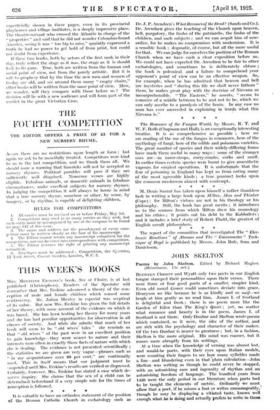THIS WEEK'S BOOKS
MRS. MONTEITH ERSKINE'S book, Sex at Choice, is at last published (Christophers). Readers of the' Spectator will remember that Mrs. Erskine advanced a theory of the conception of male andfemale children which roused some controversy. Mr. Julian Huxley in especial was sceptical of its value. But now Mrs. Erskine has given the full details of her theory, with some account of the evidence on which it was based. She has been testing her theory for many years and she has had peculiar opportunities for observation in all classes of society. And while she admits that much of her book will seem to be ".old wives' tales" she reminds us that "old wives" of the past were in an excellent position to gain knowledge—they were nearer to nature and their interests were often in exactly those facts of nature with which she is dealing. The evidence is not presented scientifically ; the statistics we are given are very vague—phrases such as "in my acquaintance over 80 per cent." are continually used. This in itself means that our judgment must be suspended until Mrs. Erskine's results are verified or disproved. Certainly, however, Mrs. Erskine has stated a case which deserves inquiry. She claims that the sex of a child can be determined beforehand if a very simple rule for the times of conception is followed.
It is valuable to have an orthodox statement of the position or the Roman Catholic Church in eschatology such as
Dr. J. P. Arendzen's What Becomes of the Dead? (Sands and Co.). Dr. Arendzen gives the teaching of the Church upon heaven, hell, purgatory, the limbo of the patriarchs, the limbo of the children, and such subjects ; and we can acquit him of cowardice, for he makes no compromises with modernism. It is a sensible book ; dogmatic, of course, but all the more useful for that. We can judge for ourselves the position of the Roman Church when we have . such a clear exposition before us. We could not have expected 'Dr. Arendzen to be fair to other eschatologies, and sometimes he is deliberately obtuse ; the book is polemical, and a failure to comprehend your opponent's point of view can be an effective weapon. So, .for example,_ when he has admitted that heaven and hell are mysteries and "during this life we shall never fathom" them, he makes great play with the doctrine of Nirvana as incomprehensible. "Thee Eastern," he asserts, seems to conceive of a middle between to be and not to be, which we can only ascribe to a paralysis of the brain. In any case no man has ever succeeded in explaining in iyOrds what this Nirvana is."
The Romance of the Fungus World, by Messrs. R. 'I'. and W. F. Rolfe (Chapman and Hall), is an exceptionally interesting treatise. It is as comprehensive as possible ; here we are reading of the use of the fungus in commerce, here of the mythology of fungi, here of the edible and poisonous varieties. The great number of species and their widely-differing forms have made "them useful in many ways ;" Sonic of the:stranger uses are—as razor-strops,. 'Curry:comb:3; corks and snuff. In earlier times certain species were burnt to give anaesthetic vapours for surgical operations. It is unfortunate that the fear of poisoning in England has kept us .from eating many of the most agreeable kinds ';' a true 'gourmet looks upon the common mushroom almost with contempt.
M. Denis Saurat has taken upon himselfa rather thankless task in writing a large book upon Milton, Man and Thinker (Cape) ; for Milton's virtues are not in his theology or his philosophy. Still, the book has great merits ; it introduces us to the sources from which Milton drew his cosmology and his ethics ; • it. points out his debt to the Kabbalists ; and it includes a brief study of Robert Fludd, the greatest of English occult philosophers.
The report of the committee that investigated The "Electronic Reactions" of Abrams and The " Emanometer" Technique of Boyd is published by Messrs. John Bale, Sons and Danielsson.










































 Previous page
Previous page